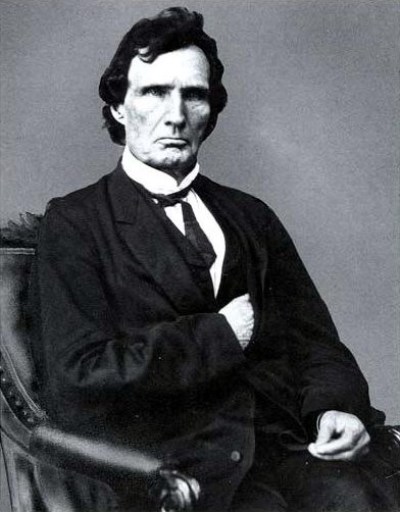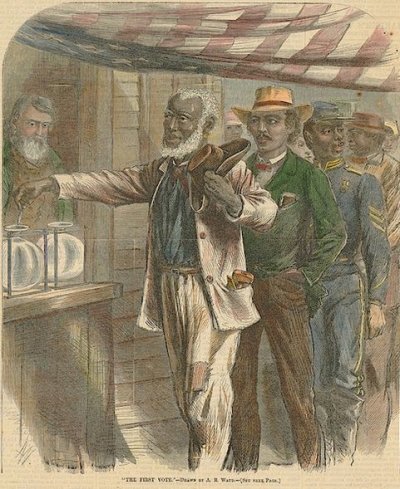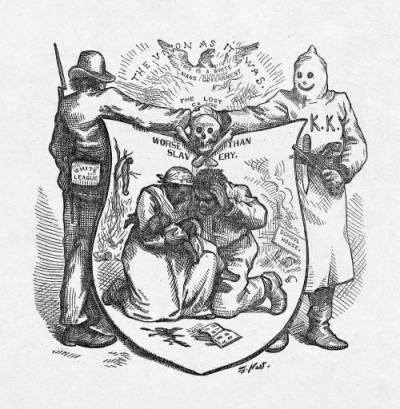Monumental 1964 Civil Rights Act Has 19th Century Roots

As the nation celebrates the 50th anniversary of the Civil Rights Act that was signed into law by President Lyndon Baines Johnson in 1964, a lesser known Civil Rights Act was signed into a law almost 100 years before, in 1866.
The 1964 document barred discrimination on the basis of race, religion, sex and national origin, and was followed by other federal legislative civil rights measures like the Voting Rights Act (1965) and Fair Housing Act (1968).
For months, various events and gatherings have occurred in remembrance of the major milestone in the struggle for racial equality in the United States.
Lesser known, however, is a piece of federal legislation similarly minded that was signed into a law almost 100 years before.
Known as the Civil Rights Act of 1866, it became law as part of Reconstruction, when radical Republicans in Congress sought to remake the political and social fabric of the old Confederacy.
This act came in response to efforts by many southerners to maintain a white supremacist society, said Theodore Delaney, associate professor of history at Washington and Lee University to The Christian Post.
"Shortly after the Civil War had ended, white southerners enacted a series of black codes that were aimed at restoring the antebellum status quo as far as race relations were concerned," explained Delaney.
"There was a Civil Rights Act of 1866 that attempted to correct the problems created by the black codes."
The 1866 act was initially vetoed by President Andrew Johnson but Congress overruled him with a two-thirds majority.
The Civil Rights Act of 1866 was one of multiple legislative efforts, including three constitutional amendments, aimed at ending the racial inequality of the South.
"The 1866 act concerns civil rights to own property, to make contracts, and to get the protection of the law; it was concerned to elevate blacks to the status of equal citizens with whites," said George Rutherglen, University of Virginia law professor who has written extensively on civil rights history, to CP.
"The main civil rights acts of Reconstruction were the Civil Rights Act of 1866, to enforce the prohibition against slavery in 13th Amendment; the Enforcement Act of 1870 and the Civil Rights Act of 1871 (otherwise known as the Ku Klux Klan Act) to enforce the 14th Amendment, providing for equal protection and due process, and the 15th Amendment, providing for equal voting rights regardless of race."

Backlash
Hostile responses came for the Reconstruction era legislation. Some pieces were declared unconstitutional by the U.S. Supreme Court, while others were simply unenforced.
"Had previous laws been enforced, even the 'separate but equal' requirement of the Supreme Court, laws like the Civil Rights Act of 1964 would have been unnecessary," explained Delaney.
During the 1880s and 1890s, a wave of white supremacist sentiment in the South mixed with growing Northern and federal indifference to open the door for Jim Crow legislation and a reasserting of the old race-based caste system.
This included a wave of lynchings, economic marginalization, and intimidation deriving from the Ku Klux Klan and oftentimes law enforcement officials.
It would be nearly a century before the next sweeping federal legislation against civil rights violations on the basis of race became law.
The long civil rights movement
Increasingly, scholarship on the history of post-Civil War America, in particular the South, has looked into the notion of "the long civil rights movement."
This view of American history points to the myriad of civil rights activism that took place from the end of Reconstruction until the 1950s.
Efforts to boycott segregated public transportation, register blacks to vote, and create job security were performed by numerous grassroots organizations throughout the Jim Crow South before Rosa Parks and Dr. Martin Luther King Jr. became notable figures.
"Black organizations began working for civil rights as early as 1890; they were persistent if not entirely successful," said Delaney.

When asked by CP why many Reconstruction era civil rights efforts seemed forgotten by American society, Delaney attributed it to public education and lacking knowledge of history.
"Many southern high schools have only recently begun to teach Reconstruction. Those years were omitted in white schools of the South," said Delaney.
"More important, most Americans don't know much American history period — and certainly nothing about the history of black civil rights. Most Americans have not had a course in American history since 11th grade high school; that includes people with college degrees."
Rutherglen, however, noted that the 1866 act and other 19th century measures "have not been forgotten in the legal culture."
"Around the time of the passage of the 1964 act, they were all revived by the Supreme Court, so that they could be more effectively enforced," said Rutherglen.
"More generally, the success of the 1964 act, and modern civil rights legislation that followed it, would not have been possible if Congress had not first tried out enforcement through the Reconstruction civil rights act, which provided instructive models of what did and didn't work in this field."





















